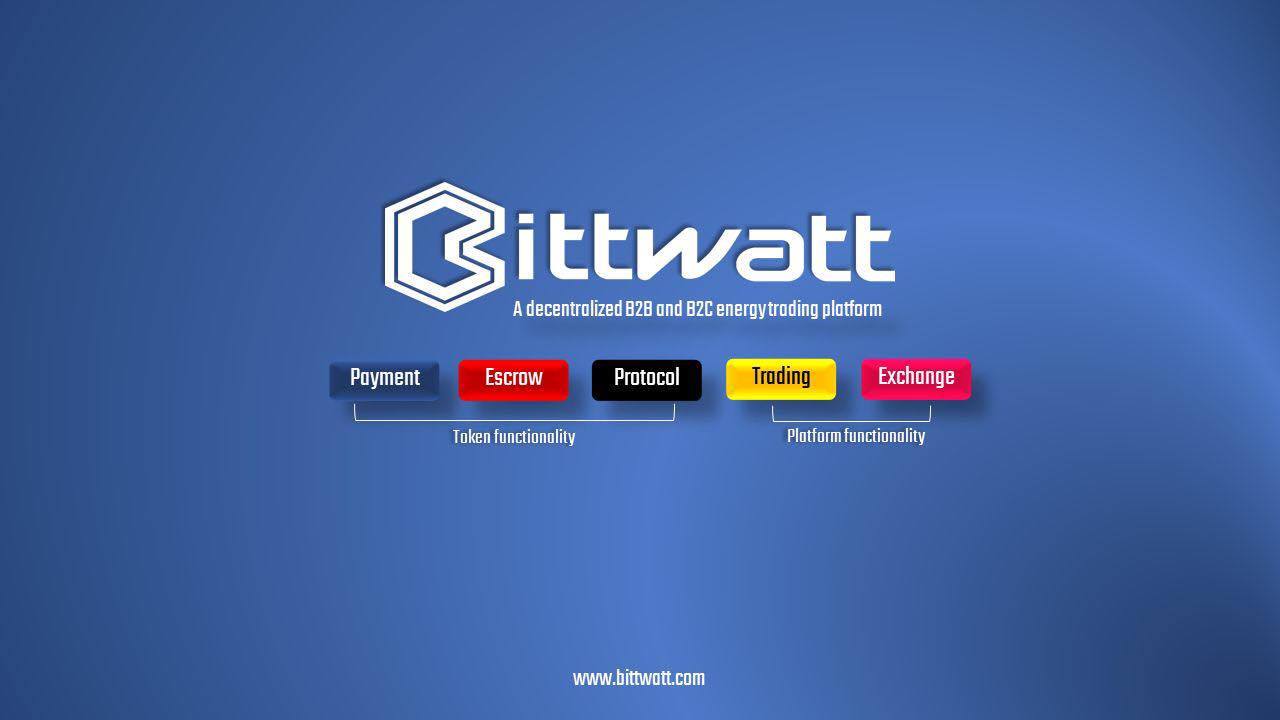‘Bittwatt’ Energy for the 21st Century

VISION
We envision a world of smart-consumers in a sustainable energy system with minimal costs for all parties.
MISSION
Our mission is to be the first international platform to integrate and facilitate cooperation between all market operators for the benefit of the consumer.
GOAL
So as to achieve this, we are committed to:
• Creating a block chain enabled energy trading market that is simple, transparent and delivers more value to all its users
• Expanding globally (London, Bucharest and Singapore being already under development)
BITTWATT Gives Solution for Problems
As things stand today, the current energy ecosystem is built around the exchange of what is essentially unstructured information. This means that literally countless types of documents are used to either sell or buy electricity, and an increasingly large number of commonplace processes (be them back or front-end) are in truth redundant, and lead only to higher prices.
Despite electricity exchange being regulated in nearly all of the world’s countries, in real world situations what we see is the buildup of significant latencies. Case in point:
• Energy exchanges between traders (or producers) and suppliers (B2B) take days for validation and completion to be completed, and there is no decentralized market where this can take place.
• There is no market for smart-consumers (B2C) from where they can a) transact unused energy supplies and b) choose and switch suppliers based on pre-selected criteria.
• Reporting electricity consumption from suppliers is done with a latency of at least 15 days, so that unbalances cannot possibly be corrected accurately or in real time.
• Energy transit is mandatorily done through the prior booking and setup of cross-border electric lanes; what’s more, once a cross-border lane is booked, it cannot be used by more than a single party — as there is currently no system in place to facilitate multi-party transfer. This is the case, despite multi-party transfer being both legal, as well as rational — since the two entities (i.e. One that concedes unused lane space and the other that takes up unused lane space) can benefit at the same time from proper use of resources.
• End-consumers (of the domestic sort) must wait at least 15 days to change energy suppliers; at most, for purely bureaucratic reasons, this process can take 90 days. (E.g. United Kingdom — 15 days, Austria — 30 days, Germany — 2–6 weeks)
It’s because of all of these reasons that prices increase. With energy transit slowed-down or even inaccessible as a real option (due to temporal, financial, or bureaucratic constraints), what all parties in the ecosystem face is a gradual yet unpredictable increase in costs. From a technical perspective, this can be summed up simply in that the ecosystem is devoid of a smart demand-response system:
• In terms of grid pressure (which is to say that production cannot be adapted to the demand in the system), and
• Commercial implications (no decentralized market exists so as to keep supply offers and request together in order to enable fast switching)
This lack of adjustability, increases costs dramatically for suppliers of energy (imbalances costs up from 300–400% from normal levels), creating a snowball effect that eventually hits end consumers.
Token Sale Details
The Bittwatt Coin Sale Goal is the equivalent of $36,000,000.00 (US).
The minimum funding goal is the equivalent of $30,000,000.00 (soft cap).
The price of one BWT in the token sale is $0.12 (average equivalent of 1 kWh).
The split of caps, bonuses, and available tokens in the various stages is illustrated in the table below:

Find more details about Bittwatt:
Official Website: https://bittwatt.com/
English Whitepaper: https://bittwatt.com/static/files/Bittwatt-Whitepaper-EN.pdf
Bountyhive Link: http://bountyhive.io/r/ShanikaMadu